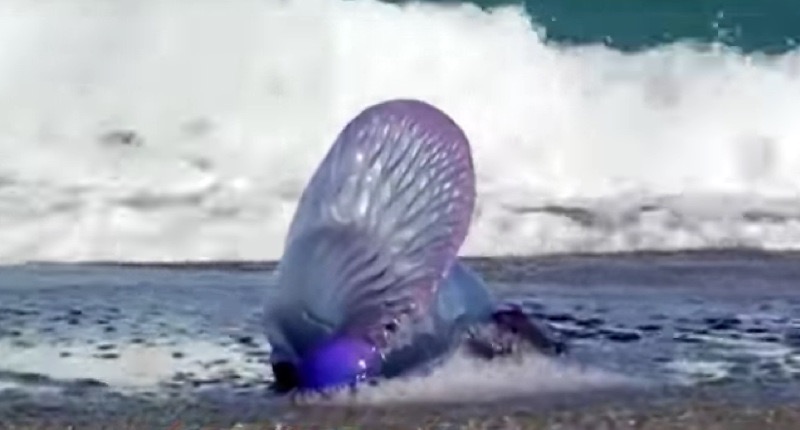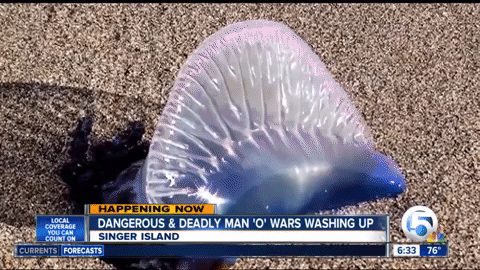
If you come across one of these beautiful purple bubbles at the beach, avoid it at all costs.
While it’s a gorgeous and unique looking sea creature, it can also do some serious damage.
With beach season soon to be upon us, it’s worth pointing out a warning about the Portugese Man-of-War, which can actually paralyze you if they make contact with your body.
These creatures travel in pods of 1,000 and have tentacles that range in size from 30-feet-long to 165-feet-long.
Some beaches even post warning signs for swimmers to take notice of these dangers lurking in the water. Don’t ignore the warnings.
As this news piece reports, the Man-of-War have…
been more problematic recently, with the YouTube description noting: “A rare problem with sea life washes up on the shores of Tybee Island this weekend. A jellyfish-like animal, the Portuguese Man O’ War, kept Ocean Rescue busy this weekend. They are also known as floating terror, with one of the most painful stings in the sea.”
In the piece, the reporter explains that experts note that rough seas wash the Man-of-War onto the shore, because “the Portugese Man-of-War can’t move on its own; it moves according to the winds, current, and tides. Also known as ‘floating terror,’ the Man-of-War looks like a jellyfish, but it’s not. It’s made up of four animals that work together.”
Beth Pallmer, the Tybee Island Marine Science Center Program Director, noted: “They are definitely native to our coast, but they are also an offshore species, so they are mainly on the open ocean. It’s only when…

we have strong wind and waves, is when they get pushed ashore.”
Hundreds were pushed on to Tybee’s shore and the area’s Ocean Rescue lifeguards had to treat dozens of Man-of-War stings over the weekend, with three people transported to the hospital.
Captain Chad Osterlund of the Tybee Island Ocean Rescue, explained, “It’s very serious. Once you get stung by a Man-of-War, you just have to keep continually monitoring the situation, where if you’re going to have an anaphylactic shock or not, because nobody knows until they get stung by one.”
The reporter also notes, “If you are stung by a Man-of-War, the treatment is not the same as a jellyfish sting.”
Osterlund explains, “A normal Man-of-War sting, you don’t want to put…
fresh water on it and you don’t want to put ammonia on it because it will aggravate it more. You’re going to want to take wet sand from the ocean and gently scrub it. It helps get the barbs out. And then you’re going to take warm saltwater and put it on there and help flush out the pores from where it’s in.”
He added, “If you see like a blue or purple balloon on top of the water, please stay clear.” The Portugese Man-of-War actually present a stinging danger whether they’re dead or alive, so curious beachgoers who come across one that appears dead on the shore should definitely avoid these animals.
Still, the reporter notes, the Man-of-War creatures are not a reason to avoid the beach entirely.









